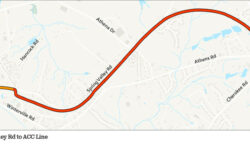It’s no secret that rents and home prices are through the roof in Athens, far out of reach for anyone with a modest income (and, increasingly, middle-class households as well). Athens-Clarke County is putting together a plan to boost the supply of affordable housing—but it won’t be cheap.
First, some definitions: Affordable housing is any housing that’s subsidized by the local, state or federal government—a definition that includes everything from public housing to Section 8 rentals to Habitat for Humanity homes. There’s also a shrinking amount of “naturally occurring affordable housing” (NOAH) that’s priced cheaply because of its age, condition and/or location in a less desirable neighborhood. As for what is affordable, that depends on your income. According to the U.S. Department of Housing and Urban Development, households should not have to spend more than 30% of their income on housing.
The problem is, housing costs have gotten out of whack with income. The median home price in Athens is $287,000, but a median-income household that makes $61,000 a year can only afford to buy a $200,000 house, according to statistics from the U.S. Census Bureau and other sources compiled by the ACC Housing and Community Development Department. Similarly, the median rent is $1,214, but the median renter can, by HUD’s criteria, only afford to pay $733.
Several people who attended an affordable housing community listening session Apr. 26 reported that their rent had risen by hundreds of dollars. “My rent has increased about 40% in the last five years,” said Alejandra Calva, HCD community impact administrator. “My income hasn’t increased 40% in the last five years.”
About 11,000 renters in Athens are classified as “housing stressed,” meaning they spend more than 30% of their income on housing. Take a family that earns $35,000 a year. They should be spending no more than $875 a month (and it’s tough to find even a studio apartment for that price). If they’re spending, say, $1,600 a month on rent, only $1,300 is left over for all other expenses, including food, child care, health care and transportation (not including paycheck withholdings).
One reason for the lack of affordable housing is that very little has been built lately. More than 100 affordable units were built in 2014, 2015, 2017 and 2018, but only 46 since 2019. “There’s just not enough units in Athens that are affordable,” Calva said.
Companies are also buying up NOAHs, jacking up rent, and leasing those units to college students rather than low-income people who pay for housing with government vouchers. “There are just so many renters in Athens that they don’t need to accept somebody who has that voucher,” Calva said.
Especially given the current high cost of construction, a government subsidy is needed to make any new housing affordable. For example, ACC has invested about $50 million in local sales tax revenue and federal American Rescue Plan Act funds into redeveloping Bethel Midtown Village, a partnership with the Athens Housing Authority and private developer Columbia Residential that also takes advantage of tax credits for low-income housing. That leaves little ARPA money left for new programs, though, unless the county commission opts to redirect some funds. “The need for funding is much greater than what we actually receive from the federal government,” Calva said.
If funding can be found, some ideas for growing the stock of affordable housing in Athens include: matching funds for federal tax credits, a housing trust fund to provide grants or tax incentives for affordable housing, a revolving low-interest loan fund for affordable housing developers, selling land owned by the ACC government to affordable housing developers, redeveloping public housing into denser, mixed-income communities like Bethel, and down payment assistance for low-income homebuyers. “It’s all about the money,” according to Calva.
Zoning policies could also make a difference. Allowing more diverse styles of housing and more density would bring down land and construction costs, for example. Those changes could be politically difficult, though, as neighborhood residents rarely want to accept more density.
ACC is accepting public input on affordable housing strategies through May 31. Another community forum is scheduled for Tuesday, May 9 from 10–11:30 a.m. at the Athens Community Council on Aging, or residents can go to accgov.com/arpa to learn more and provide feedback.
Eastside Library and TAD Input Sought
In addition to seeking input on affordable housing, ACC is looking for feedback on a site for a new Eastside library. Finalists include undeveloped ACC-owned property at 1030 Barnett Shoals Road, the early learning center at the old Gaines School, the Kroger shopping center at Barnett Shoals and College Station Road, the Green Acres shopping center, Covenant Presbyterian, Cedar Shoals High School, the Thornton Plaza shopping center on Lexington Road and the ACC Landscape Management facility on Lexington Road. Some sites are large enough where current uses could coexist with the library, according to Commissioner Carol Myers. Open house meetings are scheduled for 2–4 p.m. May 6 at the ACC Library, 12–2 p.m. May 11 at Fire Station 7 on Barnett Shoals and 5–7 p.m. May 11 at the East Athens Development Corp. on McKinley Drive. Or, residents can weigh in at accgov.com/eastsidelibrary.
The public can also comment on an East Athens tax allocation district, stretching from the eastern edge of downtown to the Nellie B area, where taxes generated by new development can be reinvested in the community. There will be two open house meetings, from 5-7 p.m. May 11 and 8:30-10:30 a.m. May 17 in the multipurpose room at Heard Park, 400 McKinley Drive. For more information, visit accgov.com/tads.
Like what you just read? Support Flagpole by making a donation today. Every dollar you give helps fund our ongoing mission to provide Athens with quality, independent journalism.









